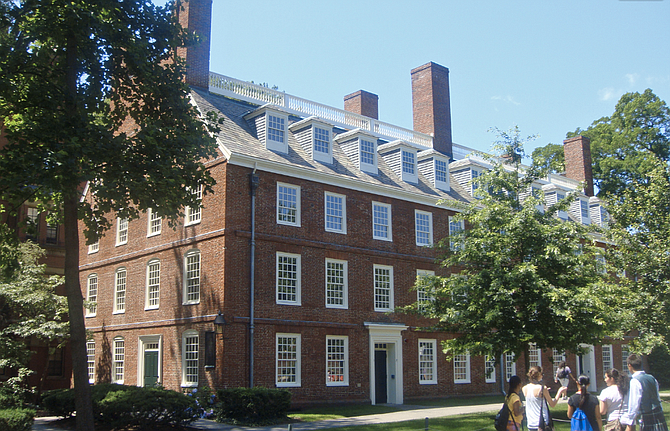The American Civil Liberties Union and ACLU of Massachusetts filed a friend-of-court brief supporting Harvard University’s right to consider race as one of many factors in a whole-person admissions process.
The following is a verbatim release from the American Civil Liberties Union:
BOSTON — The American Civil Liberties Union and ACLU of Massachusetts filed a friend-of-court brief supporting Harvard University’s right to consider race as one of many factors in a whole-person admissions process.
The case, Students for Fair Admissions v. Harvard, is led by anti-affirmative action crusader Edward Blum. Blum is once again seeking the elimination of all race-conscious admissions practices after failing to do so in Fisher v. University of Texas, where the Supreme Court reaffirmed that diversity is a “compelling governmental interest,” permitting schools to consider race. After the loss in Fisher, Blum lamented that he “needed Asian plaintiffs” — who indubitably face discrimination and stereotypes in society — in order to pit minorities against each other for political gain.
The ACLU argues a whole-person, race-conscious admissions process furthers a university’s academic freedom to assemble a diverse student body. SFFA’s proposed remedy to entirely remove consideration of race in admissions — including the context it provides into how other factors are measured — conflicts with the right of universities to select its student body. Should any admission practices unfairly disadvantage any group, the solution is to amend the practice but not to discard wholesale a diversity program that benefits all students.
“Considering race as one of many factors in order to create a diverse student-body is not only a worthy institutional goal of a university, it’s one protected by the Supreme Court. Students who learn from each other and are exposed to a variety of experiences, backgrounds, interests, and talents are better prepared for a pluralistic society,” said Dennis Parker, director of the ACLU’s Racial Justice Program. “Refusing to recognize race or any other characteristic in admissions is inconsistent with the value of considering each person individually. Claiming not to see color simply recycles the tired myth of a post-racial America. If you cannot acknowledge someone’s race, you risk not acknowledging them.”
Groups exemplifying a diverse array of voices have supported Harvard with friend-of-court briefs. They include:
American Council on Education
The Accreditation Council for Pharmacy Education (ACPE)
The American Association of Colleges for Teacher Education (AACTE)
The American Association of Colleges of Nursing (AACN)
The American Association of Collegiate Registrars and Admissions Officers (AACRAO)
The American Association of Community Colleges (AACC)
The American Association of State Colleges and Universities (AASCU)
Association of University Professors (AAUP)
The American College Personnel Association (ACPA) College Student Educators International
The American Dental Education Association (ADEA)
The American Indian Higher Education Consortium (AIHEC)
The American Speech-Language-Hearing Association (ASHA)
The Association of American Universities (AAU)
The Association of American Colleges and Universities (AAC&U)
The Association of American Law Schools (AALS)
The Association of American Medical Colleges (AAMC)
The Association of Catholic Colleges and Universities (ACCU)
The Association of Community College Trustees (ACCT)
The Association of Governing Boards of Universities and Colleges (AGB)
The Association of Jesuit Colleges and Universities (AJCU)
The Consortium of Universities of the Washington Metropolitan Area (CUWMA)
The Council for Opportunity in Education (COE)
The Commission on Institutions of Higher Education of NEASC
The Council of Graduate Schools (CGS)
The Council of Independent Colleges (CIC); EDUCAUSE
The Graduate Management Admission Council (GMAC)
The Law School Admission Council (LSAC)
The Middle States Commission on Higher Education (MSCHE)
The National Association for College Admission Counseling (NACAC)
The National Association of College and University Business Officers (NACUBO)
The National Association of Diversity Officers in Higher Education (NADOHE)
The National Association of Independent Colleges and Universities (NAICU)
The National Association of Student Financial Aid Administrators (NASFAA)
Phi Beta Kappa
The Student Affairs Administrators in Higher Education (NASPA)
The WASC Senior College and University Commission (WSCUC)
Coalition for a Diverse Harvard
NAACP-LDF
Harvard-Radcliffe Black Students Association
Kuumba Singers of Harvard College
Fuerza Latina of Harvard
Native Americans at Harvard College
Harvard-Radcliffe Asian American Association
Harvard-Radcliffe Asian American Women’s Association
Harvard Asian American Brotherhood
Harvard Vietnamese Association
Harvard-Radcliffe Chinese Students Association
Harvard Korean Association
Harvard Japan Society
Harvard South Asian Association
Harvard Islamic Society
Task Force on Asian and Pacific American Studies at Harvard College
Harvard Phillips Brooks House Association
Harvard Minority Association of Pre-Medical Students
Coalition for a Diverse Harvard
First Generation Harvard Alumni
Native American Alumni of Harvard University
Harvard University Muslim Alumni
Harvard Latino Alumni Alliance
Institutions of Higher Learning
Brown University
Case Western Reserve University
Columbia University
Cornell University
Dartmouth College
Duke University
Emory University
George Washington University
Johns Hopkins University
Massachusetts Institute of Technology
Princeton University
Stanford University
University of Pennsylvania
Vanderbilt University
Washington University in St. Louis
Yale University
Lawyers’ Committee for Civil Rights and Economic Justice, Asian Americans Advancing Justice
Walter Dellinger, Douglas B. Maggs Professor Emeritus of Law at Duke University
Copyright Associated Press. All rights reserved. This material may not be published, broadcast, rewritten, or redistributed.
More like this story
- Federal Judge Upholds Affirmative Action at Harvard
- Government Accuses Harvard of 'Outright Racial Balancing'
- Justice Denies Broad Move Against College Affirmative Action
- AP Interview: DeVos Says She Didn't Decry Racism Enough
- A Colorblind Constitution: What Abigail Fisher's Affirmative Action Case Is Really About



Comments
Use the comment form below to begin a discussion about this content.